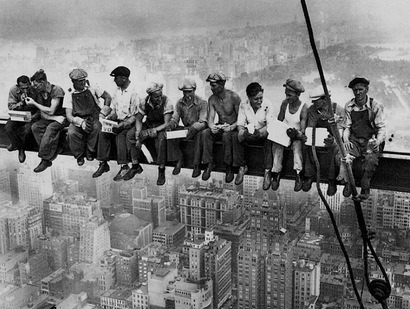
Agencies don't hire between Thanksgiving and New Years. That's a fact that holds so true that I tell my students who graduate in early December to just chill, get their portfolio together, enjoy the holidays, refresh, and plan to hit the ground running in January.
Over the years, we've written quite a bit about various aspects of the job search. I thought it might be helpful to compile some of those posts here in some sort of order. So, as you get ready to jump into the job search, here are some things to keep in mind:
1) Portfolio. Obvious, right? But just because you've graduated doesn't mean your portfolio is finished. Your portfolio is NEVER finished. Get your work together. Get your website polished. And get ready to keep working on it until you retire. Here are some questions you can ask about your portfolio.
1b) Presentation. Your website speaks for itself. The moment it loads in my browser window, it says something about you. There are plenty of very simple portfolio-hosting sites that are easy enough my mother could set up a professional-looking portfolio in a day. DO NOT let your site's appearance kill your chances before anyone sees your book. This goes for real-world opportunities too. If you have someone coming into school to look at portfolios or are going to a portfolio review of any kind, be professional about it. It's an opportunity to make an impression. Don't bring a stack of foam-core boards in a plastic grocery bag (I've had it happen before).
2) Contacting agencies. Have your list. Use your connections (friends, alumni, LinkedIn). Start sending out emails or making calls. Here's a post about writing down your five criteria to help you narrow down your agency search, a few examples of emails and followups, and another on what not to say in your email.
3) The interview. Know what you're looking for. When someone comes in to show their book to me, I always ask first: "What are you looking for?" As in, do you want me to comment on everything in your book? Are you looking for "what to keep in my book and what to take out?" Do you want our agency to hire you? It might seem obvious if you're sitting in someone's office showing your book, but it's not. Be clear about what you're looking for. And have an opinion on work in your book. I ask questions about pieces I like. I often ask the person I'm interviewing what they like best, because I want to know what kind of work they like to do most. And know what questions you want to ask about the agency. Here's a good starter list.
4) The followup. When you're interviewing, write down the names of the people you talk to. Ask them each for a business card. And then send a thank-you note afterward. It can be a card, which is nice, or simply an email. It shows the person appreciation for the time they spent with you and, more importantly, is another opportunity to connect with them.
5) The negotiation. If you're a student, there shouldn't be much negotiation, really. Getting into a good agency where you can learn and grow and do good work is invaluable coming out of school. So whether you making $40k or $50k a year isn't as important as the kind of work you'll be doing. I know that $10k sounds like a ton when you have school loans, etc., but going to a place where you make less but have the opportunity to build a great book will pay off multiple times over in the long run.
Finally, here's a post Greg did about the timeline of the whole process.
Good luck in your search.



































